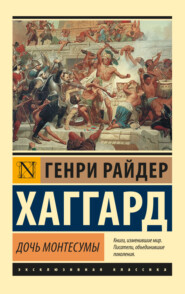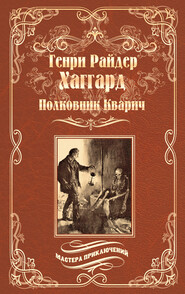По всем вопросам обращайтесь на: info@litportal.ru
(©) 2003-2024.
✖
Mary of Marion Isle
Настройки чтения
Размер шрифта
Высота строк
Поля
Holding his hat in his hand, for he knew the cause of Mrs. Josky’s suspicions and wished to air his head, Andrew pursued his way through the devious streets of Whitechapel, till he came to a remote region in the neighbourhood of the river. Here in some bygone generation there had been houses of importance, occupied no doubt by prosperous tradesmen or merchants of the day. One of these, a red brick Georgian mansion of some pretensions, stood among a mass of mean dwellings that, as the value of land increased, had been built on what were once its extensive gardens, whereof nothing remained except a desolate little patch of ground in front of the house, upon which stood the foundation walls of a long-departed greenhouse. This dwelling, which was still known as Red Hall probably from its colour, was now the abode, private and professional, of Dr. Watson, a very eminent man in his way, but one whose career had been injured by his peculiarities and his open, often ill-timed, advocacy of extreme Socialistic views.
Mounting the dirty steps Andrew came to the front door, the massive dignity of which many successive layers of different coloured paints and graining could not conceal. Indeed, a splinter chipped off by the vagrant stone of some mischievous boy, showed that it was made of no humbler wood than old Honduras mahogany, while the tarnished brass knocker of twisted snakes also testified to the former standing of the house within.
As the bell was out of action he applied himself to this knocker for some time without result. At length the door was opened by a dilapidated, snuff- coloured little woman with watery eyes and hair that looked like faded tow, who appeared to be irritated at being summoned from the lower regions.
«Why couldn’t you go round by the surgery, Brother West» (everybody at Red Hall called each other Brother or Sister), she asked in a high and squeaky voice which suggested an effort to smother tears. «Here I am with the tea to get ready, to say nothing of the supper to cook, and the kettle boiling over at this very moment into the gas stove, making enough smell to poison one, and you come hammering, hammering at the front door which Sister Rose is too proud to open, till I don’t know the teapot from the saucers.»
«I’m sorry, Sister Angelica, but I thought the Doctor might be busy in the surgery.»
«Busy! Of course he’s busy. He’s always busy doing work for a pack of ragamuffins who never give him so much as a thank-you. What’s more, he’s got that Harley Street swell, the famous Somerville Black who looks after the Royalties and has three carriages and pairs, in there with him.»
«Somerville Black!» said Andrew with respect. «What’s he doing here? It’s scarcely his beat.»
«Oh! I don’t know. Some case the Doctor’s got hold of which interests him. A girl who’s the daughter of a fish-hawker and thinks that she’s three girls and acts as such.»
«Three girls!»
«Yes, Brother, or rather two girls, one herself and the other a farmer’s daughter, and a dead woman, I think it is Mary Queen of Scots, or Lady Jane Grey, or some one. When she’s herself she talks fish and swears as might be expected with her bringing up. When she’s the farmer’s daughter she talks cows and pigs and lectures on agriculture, although she’s never been out of Whitechapel or seen one of them alive; and when she’s the party that was going to be beheaded she takes on wonderfully, just like Shakespeare, the Doctor says.»
At this moment a dull explosion sounded from below.
«Heavens above! there’s that gas stove blowing up,» exclaimed Sister Angelica, and vanished away like a grey ghost, leaving Andrew to his own devices.
Chapter III
Rose
Andrew, who knew the house, went down the long centre passage to a certain door and opening it, entered a very pleasing Early Georgian room whereof the walls were covered by large pine panels, once painted white no doubt, but now of a faded grey, and remarkable for a beautiful Adam mantelpiece, carved pine cornices, and a moulded ceiling of the period. It was well furnished, too, in its way, for furniture, when he could pick it up cheap, was Dr. Watson’s one extravagance. Thus there were some good Queen Anne pieces; also a really fine Elizabethan refectory table, untouched and with the true bulbous legs (Sister Angelica hated that table because it took so much polishing). Lastly, there were a few excellent pictures also picked up by Dr. Watson, and over the whole place brooded a kind of peaceful charm as is sometimes observable in Queen Anne or Georgian rooms.
Noting to his disappointment that the place was empty, Andrew walked up and down casually examining the pictures and wondering whether Miss Rose had told him to come at five, or half-past. For ten minutes or more he continued to wonder, till at length that young lady appeared. Certainly she was a charming sight as she glided into the room wearing a white dress which, though simple, fitted her tall and rather stately figure well enough. Anywhere Rose Watson would have been reckoned a beautiful woman, one among ten thousand. She had all the points of beauty; an exquisitely tinted face, large blue eyes, a shapely head on which her plentiful golden hair was coiled like a crown, a sweet mouth, a well-cut nose not too sharp, and long, delicate hands and feet. Also her voice was low and gentle and her movements were full of native grace. In short, she was lovely, a perfect type of the Eternal Feminine.
«How do you do, Mr. West?» she said, colouring slightly, perhaps because of the evident admiration that was written in his eyes, or perhaps because it was her weakness, or her gift, so to do when she addressed a man. «Forgive me if I do not call you Brother after our silly fashion here, but really I can’t.»
«The last thing in the world I wish is that you should call me Brother,» he answered in a rather shy way, adding, «About whatever others I may be indefinite, upon that point I am quite clear.»
«I am sorry to have kept you waiting,» she went on hurriedly, dropping the blue eyes, «but that silly old Angelica has made some frightful mess with the gas stove and nearly blew us all up. I found her covered with blacks and with a lock of her hair on fire.»
«I dare say,» replied Andrew. «Tow burns easily, doesn’t it?»
She laughed a little and remarked good-naturedly:
«Well, it is rather like tow now you mention it. Then I hear that Dr. Somerville Black is coming into tea and I had to find the best things. I wish he wouldn’t.»
«So do I,» murmured Andrew.
«Oh!» she continued with an outburst of genuine feeling, «how horrible it is to be poor and have only one servant, or rather none at all, for Angelica is a kind of cousin, you know, not a servant.»
«I’m not sure,» said Andrew. «Poverty has its advantages. You, I understand, would like to be rich.»
«Of course I should. I will be quite honest about it. I should like to have carriages and jewels and proper dresses and a fine house with lots of people to wait on me. Then I should be quite happy,» and she laughed again in her charming, rather childish fashion.
«Perhaps you wouldn’t be happy after all, Miss Watson. I have just come from seeing some people who have all these things in abundance and they are not happy – except perhaps Clara,» he mused aloud.
She looked up quickly as though she would like to ask who Clara was, but if so, she refrained and only said:
«Wouldn’t you like to be rich, Mr. West? But perhaps you will one day.»
«I don’t think so,» he answered, shrugging his shoulders, «unless I should become a successful man like Somerville Black, which is most improbable, and I don’t know that I want to.»
She considered him for a little while in an innocent way, playing with the red rose she wore in the bosom of her white dress, but said nothing.
«What’s the use of riches?» he went on, suddenly taking fire. «At best they are only an addition. I’d rather have health, or happiness, or ability, or the power to do good to others, than any amount of riches. At the present moment,» he added slowly, «to take a concrete example, I’d rather have that rose than a cheque for a thousand pounds.»
Again she laughed gently, looking at him doubtfully, but not without a certain amount of admiration, as she answered:
«When it has faded, say by to-morrow morning, you may think that you would rather have had the thousand pounds. However, if you believe it worth so much, you can have it for nothing, because, because – I have a prettier one upstairs.»
«I am content with that because you have worn it,» he answered, stretching out his hand.
She began to unfasten the rose, which seemed to be an intricate and lengthy operation, and Andrew apparently thought it an act of common kindness to try to help her, with the result that he pricked his finger rather badly. However, it was out at last and in his hand. Then something happened to him. His heart began to beat violently, a mist swam before his eyes, he lost his reason, his judgment, everything that distinguished him in ordinary moments, as, in short, Nature for her own purposes decrees that most men and some women must occasionally do. The issue was that quite undesignedly and without the smallest premeditation he kissed that lovely girl full upon the lips.
«Oh!» she said, turning the exact colour of the red rose in his hand and looking first as though she were going to cry and then to laugh; for to tell the truth at that instant laughter was nearer to her than were tears. «Oh! you know you oughtn’t to do that.»
«I don’t care,» said Andrew defiantly. «I love you.»
What else he would have said or done remains dark, for at that moment footsteps were heard in the passage and a big genial voice saying:
«In all my professional experience, which is fairly extended, I do not think I ever met such a case. Of course, we are aware that a woman is never what she seems to be, except when she is in a rage, but you don’t often find one who announces herself to be three people and without any histrionic training plays all the parts so well.»
«No,» answered another rather dreamy voice, that of Dr. Watson. «It suggests all sorts of queer things, doesn’t it? For example, reincarnation and the imprisonment of sundry entities in one corporeal shape.»
«Ah! Doctor,» said the big voice of Somerville Black, «there you are getting into mysticism, which personally I find it safer always to put out of court. To me, therefore, at present it suggests an unusual and most complicated case of nerves, resulting probably from suppressed instincts.»
Then came a crash, followed by:
«Hullo! Ma’am, I didn’t see you coming.»
«Oh!» exclaimed Rose, «that idiot Angelica has run into him with the tea-tray in the dark passage,» and promptly she sped like a swallow towards the door.
As she reached it, it opened, and behold! there was a second collision, this time between Rose and the large advancing shape of Dr. Somerville Black.
With another «Oh!» she recoiled, as a bird might that had unexpectedly come into contact with a bull, and would have fallen had not the advancing Andrew caught her.
«I begin to think,» went on the big voice, «that I have been reincarnated as a shunting railway truck. However, young lady,» he added, suddenly realizing the kind of person with whom he had to do, «if you like to come out of that friendly shelter and charge again, I am sure I don’t mind.»
Then followed explanations, in the midst of which Dr. Watson, who had stayed behind in the passage to assist with the overset crockery, arrived upon the scene. He was a tall, thin, nervous-looking man, with dark eyes and a clean- shaved, ascetic face that would have become a mediæval saint, on which from time to time appeared a smile of singular sweetness. Idealist was written all over him, especially in his eyes which had the dreaming look of the typical visionary. Curiously enough, there was a considerable resemblance between him and Andrew; indeed, they might easily have passed for father and son. Nor did this cease with their physical characteristics, since their mental fibre and attitude were very similar. Both of them were dreamers, both were somewhat impracticable, neither of them had in him the making of a successful man, as the world understands success. Of course, it was the lack of these qualities, as also the presence of others, that drew the two together. From the time that Andrew had appeared at the hospital, a shy, awkward, unusual kind of youth, Dr. Watson had taken a fancy to him which, as years went on, ripened into as much friendship as is possible between men of such different ages. He became his favourite pupil, and somehow it was always understood, without anything very definite being said on the matter, that when he was qualified he would join Dr. Watson in his Whitechapel practice.
Catching sight of him the Doctor’s face brightened with one of his sweet smiles.

















